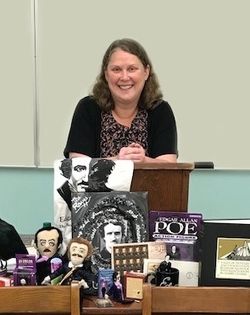Fall 2024 MHC Special Topics and Colloquia
MHC colloquia classes offer a distinctive academic experience, combining the depth of specialized study with the breadth of interdisciplinary exploration. These courses are designed to engage intellectually curious students in intensive discussions, research, and critical analysis of complex topics. Unlike traditional lecture-based classes, honors colloquia emphasize interactive learning, encouraging students to actively participate in debates, collaborative projects, and experiential learning opportunities.
Click below to explore Fall 2024 colloquia course offerings. To view past semesters, click on the sub-menu to the right.

Mindsets Matter: Exploring the Power of Mindsets |Tuesdays/Thursdays 9:35 - 10:55, HCIC 3024
Do you think intelligence/ability (or personality) is largely fixed or malleable? Do you see stress (or self-doubt) as debilitating or motivating? Do you see depression as a disease or as a signal that serves a purpose? Do you believe that people are in control of their emotions and actions? This seminar will explore how mindsets (i.e., implicit beliefs about aspects of the self or of the world) impact our reactions and adaptation to objective reality. Over the course of a semester, students will be challenged to think critically about research from various areas of psychology (e.g., educational, developmental, social, clinical), which suggests that our thoughts, beliefs, and expectations significantly impact performance, well-being, and resilience.
Specifically, students will explore research on the factors that influence mindsets such as socio-cultural experiences. Students will uncover how mindsets about ability, personality, self-doubt, depression, anxiety, stress, etc. impact academic, social, and mental health resilience. Students will also explore the mediators and moderators of the relationships between adaptive mindsets and the outcomes. Finally, students will have the opportunity to consider real world applications of these connected lines of research and consider the ethical implications of mindset interventions.
Throughout the class, students are expected to play an active leader role in reading, thinking, discussing, writing, and presenting. The instructor will guide the learning process by providing relevant readings, facilitating discussions, designing rubrics for writing assignments, and helping students develop a research proposal of their own.

Torture in Fiction and Film | Mondays/Wednesdays 3:25 - 4:45, HCIC 2007
This course will consider both the concept and the lived experience of torture in the fictional context of literature and film. We will consider the political, moral, philosophical, social, and criminal aspects of torture as represented in fictional contexts. Toward the end of the course, we will examine the meaning of torture to the torturee, the torturer, the in-text audience, and ourselves as members of the reading/viewing audience. Perhaps the pain of looking in the mirror is worst of all.

Checkmate - Chess Strategy for Life | Tuesdays/Thursdays 2:20 - 3:40, HCIC 2001
Chess playing is a core part of the class with an emphasis on how players develop the art of strategy making. Strategy comes through learning from others and developing the skill of thinking beyond the present or past in the hope an opponent will act as desired. Part of this process involves experiencing and learning from mistakes. The practice of learning requires reflection and correction to help succeed. Successful strategists and chess players apply these lessons. This class involves playing chess for enjoyment and appreciation. Through this approach, as well as readings and discussion, we will explore practical applications of strategy for our lives.
The purpose of the class is to illustrate, through play, how lessons can be gleaned in developing a personal strategy for life that considers the implications of our choices, capitalizes on opportunities, and learns from mistakes.

William Faulkner: Selected Short Stories | Tuesdays 12:45 - 2:05, HCIC 2007
William Faulkner, one of America’s most famous Nobel laureates, adopted the short-story format for some of his most important work. These stories not only introduce the reader to the author’s imaginary Yoknapatawpha County but also to his legendary Faulknerian style, a style which, according to him, was an endeavor “to put the history of mankind in one sentence.”
In this course, students will actively participate in dissecting some of Faulkner’s legendary long sentences and in analyzing a given story’s meaning and craftsmanship. Following a reading quiz or short writing assignment, we will cover one story per week, around fourteen or fifteen by the end of the semester.

